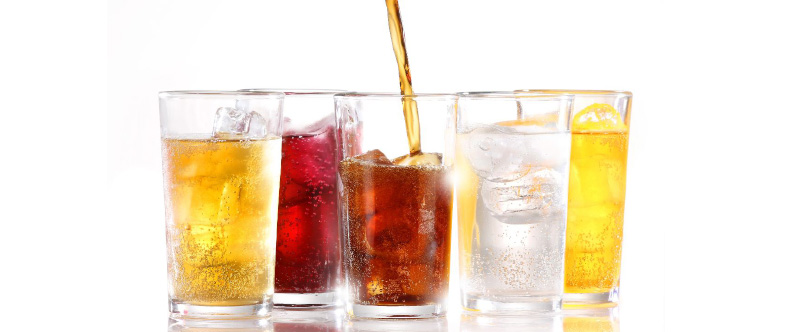Beware of Sugary Drinks
 It is best to limit or avoid sugary soft drinks and make smart choices
It is best to limit or avoid sugary soft drinks and make smart choices
Authors: Ms. Hanin Daghestani, Dr. Sohaila Cheema, Dr. Karima Chaabna, and Ms. Anupama Jithesh
Water, an essential nutrient for the human body, constitutes 60% of an adult’s body weight. Thirst alerts us that the body lacks water, so it is important to stay hydrated. Water is the best option for hydrating the body. However, the consumption of sugary drinks or sugar-sweetened beverages or soft drinks, defined as any beverage with added sugar or other sweeteners (high fructose corn syrup, sucrose, fruit juice concentrates, and more), is increasing globally. Examples include soda, fruit drinks, sports and energy drinks, nectar, and sweetened and flavored water. These are generally high in calories and practically have no minerals, vitamins, fiber, or other nutrients beneficial to our health.
Synonyms for added sugars
Added sugars are sugars incorporated during food processing (such as sucrose or dextrose), foods packaged as sweeteners (such as table sugar), as well as sugars from syrups, honey, and concentrated fruit or vegetable juices. Added sugars do not include naturally occurring sugars, such as those found in milk, fruits, and vegetables. If the following appear in the ingredient list of your favorite beverage, then you are drinking a sugar-sweetened beverage: cane juice, corn syrup, dextrose, fructose, fruit juice concentrates, agave, glucose, high fructose corn syrup, honey, malt syrup, maple syrup, molasses, raw sugar, sugar, sucrose, and cane sugar.
Sugary drinks and our health
Consumption of sugary drinks leads to weight gain and is a major contributor to the global obesity epidemic. Drinking sugar-sweetened beverages also increases the risk of type 2 diabetes, heart disease, dental cavities, gout, poor bone health, other chronic diseases, and even premature death.

Sugar free or diet drinks
Although “sugar-free” or “diet” soft drinks help cut down on calories, their long-term effect on preventing weight gain or other health problems is unclear.
Rethink your drink!
It is best to limit or avoid sugary soft drinks and make smart choices by mindfully selecting healthy beverages that provide hydration and essential nutrients. Follow these tips:
- Water is the best: Choose water over sugary drinks.
- Flavored water: Add cucumber, mint, berries, lemon or orange slices, and/or green apple to add taste and vitamins to your water.
- Tea/Iced tea: Brew your favorite flavor of tea, drink it hot or leave it in the fridge to cool down, and enjoy an unsweetened iced tea.
- Lemonade: Squeeze a lemon, add a cup of chilled water and fresh mint, mix all together, and enjoy the sourness of the lemonade.
- Fruit infusion: Take a fruit and/or herb and leave it in boiling water for 5 minutes, filter the water, and savor the infusion while giving yourself time to relax.
- Fresh juice: Make freshly squeezed fruit juice. If it is the fizz you miss, add 1/4th cup of sparkling water to your fresh juice.
- Smoothie: Nourish your body with vitamins, minerals, and fiber by blending your preferred fruit and vegetables with milk or water.
It is scientifically established that reducing the consumption of sugary drinks can decrease the prevalence of obesity and other chronic diseases and prevent tooth decay. Choosing healthy beverages is an essential part of maintaining good health, so let’s be mindful of what we use to hydrate and nourish our bodies.
Sources: Centre for disease Control and Prevention (CDC) | Harvard T.H Chan School of Public Health
Edited by: Ms. Julietta Mirghani